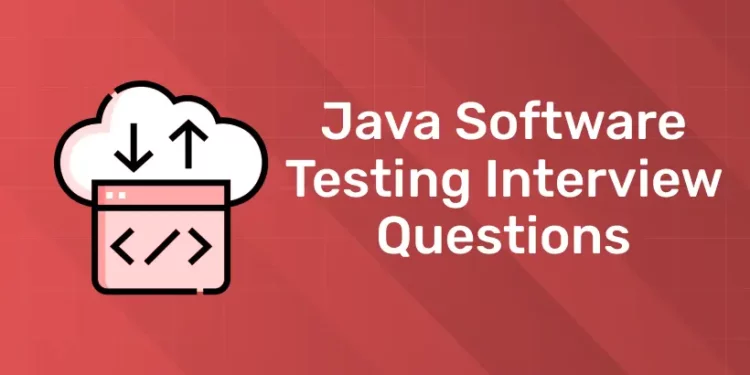Table of Contents
Being really skilled in Java is a valuable skill, and demonstrating your expertise to an interviewer will help you get the job. By reviewing prospective interview questions, you may ensure that you are well-prepared. In this article we are providing some of the top interview questions for Java software testing, as well as sample answers to assist you in the process.
Learn Software Testing from QA Experts! Get Free Demo Classes Here!
Core Java Concepts For Software Testing
While writing automated tests and comprehending the architecture of the applications being tested, a working knowledge of fundamental Java concepts is necessary. Software testing can benefit from the following important Java concepts:
Basic Java Concepts
Data Types and Variables:
- Recognize both reference and primitive data types (int, char, boolean, etc.) (objects, arrays).
- Understand how to define and set up variables.
Operators:
- Arithmetic, relational, logical, bitwise, assignment, and other operators.
- Operator precedence and associativity.
Control Structures:
- Conditional statements (
if,else,switch). - Looping constructs (
for,while,do-while).
Arrays:
- Declaration, initialization, and usage of single-dimensional and multi-dimensional arrays.
- Common operations like iterating, searching, and sorting arrays.
Object-Oriented Programming (OOP) Concepts
Classes and Objects:
- Define classes and create objects.
- Recognize the connection between objects and classes.
Inheritance:
- From preexisting classes, create subclasses.
- To inherit properties and methods, use the extends keyword.
- Recognize the super keyword and override the method.
Polymorphism:
- Compile-time (method overloading) and runtime (method overriding) polymorphism.
- Use of the
instanceofoperator.
Encapsulation:
- Use access modifiers (
private,protected,public) to protect data. - Implement getter and setter methods.
Abstraction:
- Define abstract classes and methods.
- Use interfaces to achieve abstraction.
Advanced Java Concepts
Exception Handling:
- Use try-catch blocks to handle exceptions.
- Understand the difference between checked and unchecked exceptions.
- Use
throwandthrowskeywords. - Create custom exceptions.
Collections Framework:
- Use of collections (List, Set, Map).
- Understand differences between implementations like ArrayList, LinkedList, HashSet, TreeSet, HashMap, TreeMap.
- Use of iterators and enhanced for-loop.
Generics:
- Define and use generic classes, interfaces, and methods.
- Understand type parameters and type bounds.
Streams and File I/O:
- Read from and write to files using classes from the
java.iopackage. - Use streams for data processing.
Concurrency:
- Understand threads and the
Runnableinterface. - Use
synchronizedkeyword to control access to resources. - Use higher-level concurrency utilities from
java.util.concurrentpackage (ExecutorService, CountDownLatch, etc.).
Learn Software Testing from QA Experts! Get Free Demo Classes Here!
Top Java Software Testing Interview Questions
1: What is software testing?
Q: What are the main features of Java?
Ans: Platform independence, robustness, security, object-orientation, multithreading, portability, architectural neutrality, high performance, interpreted, and dynamic.
Q: What is JVM, JRE, and JDK?
Ans:
- The Java Virtual Machine, or JVM, is an abstract machine that lets your computer run Java software.
- The Java Runtime Environment, or JRE, is what makes it possible to run Java applications by providing the JVM, libraries, and other necessary components.
- A software development kit called JDK (Java Development Kit) is used to create Java applications. JRE, an interpreter/loader for Java, javac, an archiver for jar files, javadoc documentation generator, and additional tools required for Java development are all included.
Q: How do you perform unit testing in Java?
Ans: By using TestNG or JUnit frameworks, forr example; To verify the expected results, create test cases in distinct test classes and use assertions like assertEquals, assertTrue, and annotations like @Test.
Q: What is the purpose of using automation testing tools?
Ans: Test cases may be automatically executed, test data can be managed, and the findings can be used to enhance software quality. Automation testing solutions fulfill these purposes. Their benefits include reduced human error, increased test coverage, and time and effort savings.
Q: What is a Mock Object? How is it used in testing?
Ans: A mock object is an artificial item that simulates, in a controlled manner, the behavior of actual objects. To isolate the code under test and to mimic different circumstances, it is used in unit testing.
Q: How do you handle database testing in Java?
Ans: To establish a connection and carry out actions, use Java Database Connectivity, or JDBC. Additionally, you can make use of Hibernate and other ORM (Object-Relational Mapping) solutions. Utilize assertions to corroborate the findings and write test scripts to confirm the data.
Q: Explain how you would test a REST API in Java.
Ans: For automated testing, use libraries like HttpClient or RestAssured, and for manual testing, use tools like Postman. To send HTTP queries and verify the answers, create test scripts.
Q: Explain the concept of Page Object Model (POM).
Ans: POM, a Selenium design pattern, encourages the development of an object repository for online user interface components. Every web page is modeled as a class, with variables created for each of the page’s elements. The same class contains methods designed to operate on these elements.
Q: What is code coverage? How do you measure it in Java?
Ans: The percentage of your code that is subjected to automated testing is called code coverage.
To measure code coverage, use programs like JaCoCo (Java Code Coverage), which can be coupled with build technologies like Maven or Gradle.
Q: How do you ensure thread safety in your tests?
Ans:
- Refrain from sharing changeable states among tests.
- Use data structures that are thread-safe.
- Make use of synchronization techniques such as java.util.concurrent tools or synchronized blocks.
Q: How would you test private methods in Java?
Ans: In order to use private methods, use reflection. As an alternative, rewrite the code with dependency injection or package-private the function to increase testability.
Q: What is continuous integration (CI)? How do you integrate it with your Java testing framework?
Ans: Regularly testing and merging code changes into a shared repository is known as continuous integration, or CI. Configure build jobs using Maven or Gradle to execute Java tests in order to integrate continuous integration (CI) with technologies such as Jenkins.
Are you aspiring for a booming career in IT? If YES, then dive in |
|||
Full Stack Developer Course |
Python Programming Course |
Data Science and Machine Learning Course |
Software Testing Course |











